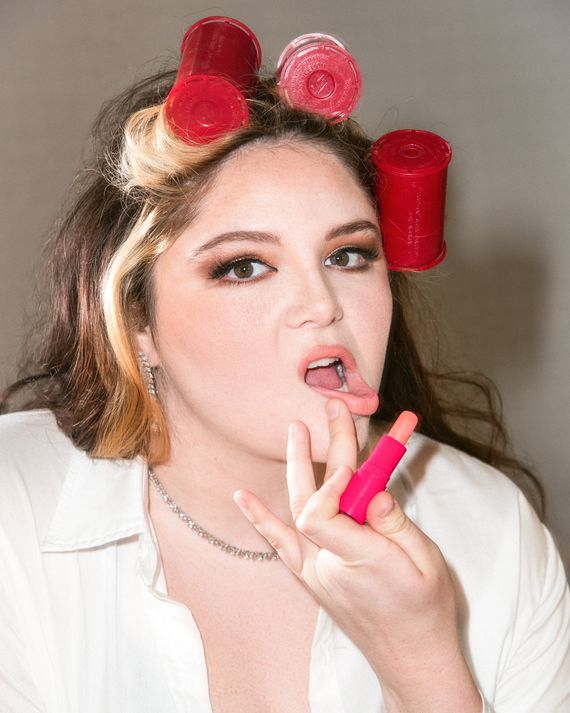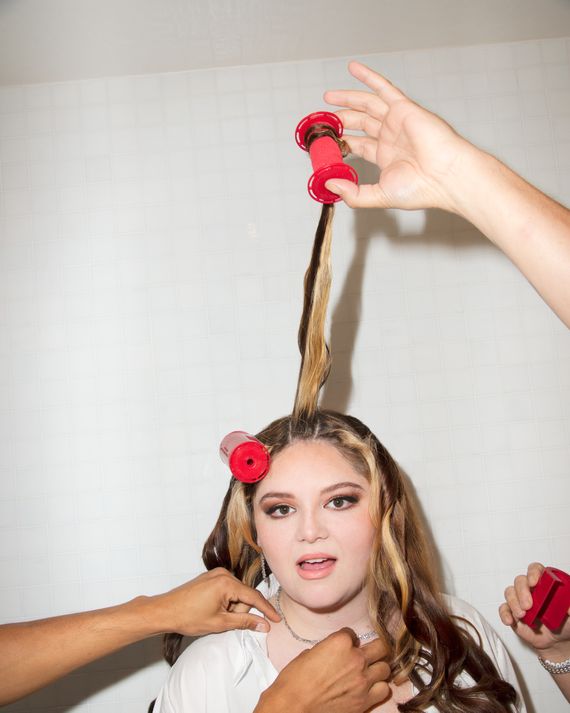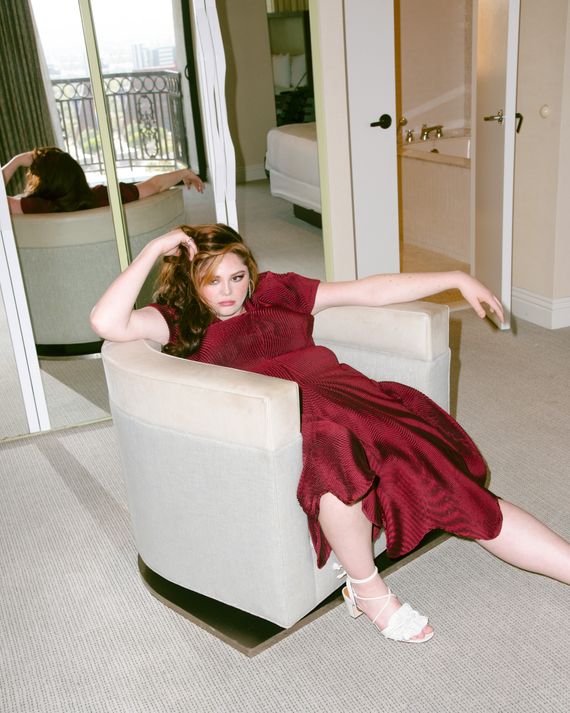
Megan Stalter doesn’t mean to peek at my notes, honest. “I’m so sorry,” she says in her midwestern-nice way. “It’s just sometimes your eyes are always looking for your name. Isn’t that psychotic?” The 31-year-old comedian is fighting a laugh through her apology because my notepad actually reads, “Is Megan Stalter real?” This is indeed a ridiculous thing to see written about yourself, but Stalter knows ridiculousness. Her biggest Hollywood flex to date has come on HBO Max’s Hacks, where she’s played the charmingly oblivious, incompetent assistant Kayla for two seasons. But, really, doing viral character work in the early lockdown days broke her first. An internal logic unites even Stalter’s most out-there creations in a common humanity, from an oversharing sex “expert” to “Drew Barrymore on the beach.” Her characters’ mannerisms are always a flimsy cover-up for base-operating levels of nerves, hostility, or unpreparedness. They pull their faces into the exact opposite of a smize and call their offscreen co-workers “girlie” through gritted teeth. The people Stalter embodies teeter between sad and funny; it’s a crapshoot of either publicly falling apart or silently screaming. Her delicate balancing act is to keep them endearing regardless.
Looking her right in the eye … liner, on the rooftop of the Thompson hotel in the Hollywoodiest part of Hollywood, I explain that the question in my notes is one of the first suggestions when you Google “Megan Stalter.” “Do you think people are searching that thinking that’s not my real name?” she asks. “Or thinking, Who’s Megan Stalter? Or, Is she being serious? ” It’s almost definitely the last one. Even her stand-up, an hour of which I’ve just experienced at the Netflix Is a Joke comedy festival, is an extended character study. Country star Maren Morris, who hosted Stalter on an episode of Jimmy Kimmel Live! last August, got a crash course. “I don’t know how I kept it together because she never broke character once the entire conversation we had. So I never really met ‘Meg,’ ” Morris tells me, then adds, “I loved every minute of it.”
The story of the “pandemic breakout star” is trite at this point, but things started getting interesting for Stalter in the couple of years leading up to the pandemic. The year she moved from Chicago to New York, 2019, marked the front-facing-camera-comedy boom, a Twitter-based scene in which Stalter emerged as one of a few main players. Comedians including Alyssa Limperis, Ana Fabrega, Eva Victor, and Rachel Wenitsky posted short videos in which they riff with themselves in one-woman character sketches. Stalter’s quickly stood out for both their silliness and the way she can tease resonant tropes of familiar types: the mean girl at church, the incompetent Trump staffer, the one-dimensional girlfriend character in a movie. (Consequently, one popular meme involves quote-tweeting videos of women acting a certain flavor of kooky — from celebrities to Karens — and simply captioning them “This is a Megan Stalter character.”) What takes them beyond pure absurdity is how keenly they capture the failed performances of everyday life, a reminder that everyone is ultimately awkward, so there’s no sense in getting down on yourself for also being, to use what Stalter tells me is her second-favorite word at the moment (the first is not fit for print), a silly little freako.
Take one beloved Stalter character: a former child actress in a nice middle-class living room playing it chill but secretly, desperately longing for fame, who tells viewers that, yes, she “actually did play Taffy Jones in the Stinky Witch movies.” The proper nouns are zany, but the emotions behind them are real. Adding to the fastidiously ramshackle rhythm of Stalter’s comedy: She’ll often just nakedly cough in the middle of a sentence and keep going without acknowledging it (in her hands, a cough is funnier than a burp or a fart). Or her characters will nervously trip on their words in what sounds like an alien dialect (she’ll start a story with “Last night, yesterday, during the day” or brag about her husband who is “premed in law”). Each technique and tic undercuts her characters’ cockiness with vulnerability.
Comedians were pivoting to Zoom and Twitch shows when Stalter began hosting Instagram Live sessions that took the solo improv of her front-facing-camera work and single-handedly pushed the whole microgenre into its longform era. At a scary-prolific rate, Stalter streamed feature-length improvised one-woman shows, each based around a loose theme. The conceit of the first video was, as she puts it, “an art class where the drawings were really bad.” She read the comments while viewers played along with the scene, joining her in the bit. “Not only did I feel like I wasn’t alone for an hour,” she says, “it also felt like we all were improv-ing. The comments were part of this pretend class.”
Actress Kathy Najimy, who has worked with her, believes Stalter has created a new genre. “There’s been improv people, there’s certainly been hilariously funny and politically funny women,” Najimy says, “but that she can somehow morph them all together into this brilliantly sprinkled doughnut, that I’ve not seen before.” Stalter’s character comedy has clear precursors, notably Amy Sedaris’s housewives on the brink or John C. Reilly’s tragicomic Dr. Steve Brule. Perhaps what feels fresh is how Stalter brings an alt-comedy sensibility and intelligence to a broad reference base that reaches beyond the usual Adult Swim demo — which is to say she’s big with the girls and the gays and maybe your Facebook-active aunt who gets it.
Stalter grew up in Ohio, “filming full movies any chance we got” with her siblings and cousins. “There were movies we’d make where I’m the girl, and my cousin’s the boyfriend, and she cheats on me,” she recalls. “We were really dramatic, elaborate children with a lot of time on our hands.” Her mom and aunt started it, though; they would film parody videos (mostly the same fake gas medicine commercial) and then hand the camera to the kids. “Sometimes they’d do a fake ‘90s talk show with us, like Jerry Springer or Maury, where it’d be like, Whose baby is it? And we would be playing those characters.” The fake soap opera romances, the paternity scares — they sound like an origin story to the sorts of videos Stalter would go on to make, many of them skewering the performativity of romance and motherhood.
In 2014, Stalter moved to Chicago, where she worked as a nanny to pay for improv classes. Doing stand-up, she soon found a comedy cohort that included the likes of Saturday Night Live’s Sarah Squirm, all exuberant weirdos in a supportive, experimental scene. There, Stalter formed a sketch group with her best friend, Paula Skaggs, called Sharky and Sharko (in which they played actual sharks working as business sharks), and hosted a gay, grungy comedy night called FreakFest. In 2019, she released a web series with her collaborator Nick Moore called The Megan Stalter Show!, a sort of lo-fi fake talk show that housed her stand-up persona: a difficult diva of stunning bravado and middling talent who is obsessed with the idea of her own stardom and constantly on the verge of a tantrum. You can imagine a version of this character who is flatly bitchy, but Stalter imbues her with stuttering charm as a low-status person who thinks she’s the highest status on earth, like a kid wearing her mom’s heels.
When Hacks debuted in May 2021, Stalter went from doing videos in which she pretends to be a fame-thirsty actress to being the standout player on one of the standout series of the year. On a show that is very much about comedy but not constantly doing comedy, her scenes opposite series co-creator Paul W. Downs crackle with jokes and non sequiturs that wouldn’t be out of place in the screwball Hollywood farces of Bojack Horseman. In person and out of character, Stalter is an earnest talker, especially when discussing her career ascension to wider, off-line screens. “I’ve always wanted to be an actor, and then I fell in love with comedy,” she admits on the roof.
Stalter has already snagged her first leading role, in the indie dark comedy Cora Bora from director Hannah Pearl Utt. The film follows Stalter as Cora, a struggling musician who goes home to Portland to try to win her girlfriend back. It will be as deep a role as we’ve ever seen from Stalter. It was also her first brush with stage fright. “We had to do this scene with tons of extras watching me sing and play guitar, and it was nerve-racking,” she remembers. “I was fully crying.” Utt held her hand through it, allowing for something beautiful to emerge from Stalter in the end.
This is the first time in our conversation when Stalter reveals some uncharacteristic worry about her work. “There is a moment where you’re like, I really hope that people see this,” she explains. “And I don’t need everyone to love my stuff or to be everyone’s cup of tea. But if a bunch of people saw me doing something for the first time that’s more vulnerable, it would hurt if they couldn’t take it seriously.” She is excited to challenge her audience to do so, though. It’s a hypothetical “girl who cried wolf” kind of thing: What if she’s been too good at being so silly this whole time?
Increasingly, Stalter has had one toe dipped in the world of influencers; sprinkled among her comedy videos is “#ad.” These sponsored-content shorts are nearly indistinguishable in style and tone from her usual videos but feature brands such as Coke, Parade, Birchbox, and Vitaminwater. Stalter’s ad-spokesperson characters fumble their words, use budget sets and props, and are generally irreverent, just as they would be were they parodying such posts. If a comedian does spon-con (spon-com?) and distributes it via the same channels as the rest of their content, does that make them an influencer? Stalter considers the idea.
“It’s interesting being a comedian now because you used to have to be seen at a festival,” she says. “Now, if you get to do a funny video that you would already do for free, why not do an ad?” Stalter isn’t even sure if people understand that the ads aren’t parodies. “I don’t think people think that they’re real.” “Megan Stalter” may be as real as any of us who post one version of ourselves to our “Close Friends” stories, another on LinkedIn, and another on Hinge. Is any of it real? Obvi, girlie.




